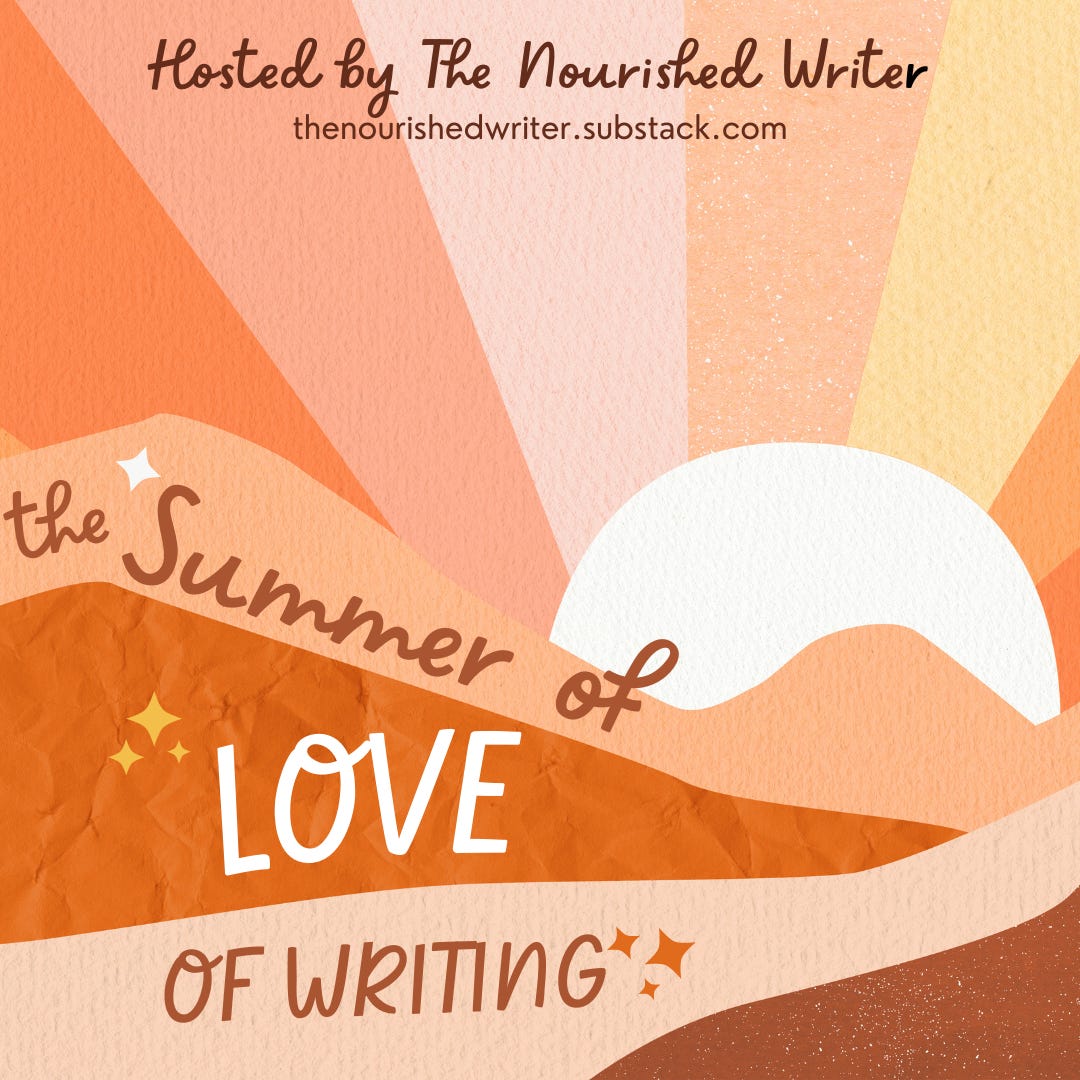A few weeks ago, I mentioned that I wanted to do a special newsletter feature for the summer called The Summer of Love of Writing. When I first thought of the idea, I had one iteration in mind. But as I’ve thought through it over the past couple of weeks, I discarded that initial idea and really tried to hone in on what stirs my love of writing when I’m struggling to get words onto the page.
Over and over I kept returning to two things:
Reading great books
Learning from other writers
Last week, I talked about boring myself and wanting to deepen my writing and my craft. Luckily, the two things above braid into that self-competition goal nicely.
Self-Competition
I’m using “self-competition” with Rick Rubin’s definition from The Creative Act: A Way of Being in mind…
“Think of self-competition as a quest for evolution. The object is not to beat our other work. It’s to move things forward and create a sense of progression. Growth over superiority.
Our ability and taste may evolve, yielding different works over time, but none can be evaluated as more or less than another. They are different snapshots of who we are, and who we were. They are all our best work in the moment they were created.”
—pg. 239, The Creative Act by Rick Rubin
I love that definition.
So, in the spirit of evolution, I’ve been reading this week not simply for pleasure but reading “like a writer.”
Reading Like a Writer
What do I mean by that? First, I love Gabriela Pereira’s tips over at DIY MFA, so I encourage you to check out her info. But basically, you read with your writer’s “glasses” on—and a pencil and sticky page markers (or book darts) nearby to mark passages. You’re looking for things like…
What is jumping out at me in this book? What am I feeling? How is the author making me feel that?
Underline the lines that make you pause and savor, the ones that make you laugh (or cringe if the read isn’t going well.) Write in the margins (I do this in pencil to feel less guilty about it, lol.)
What is the author’s purpose? Are they saying something about the world? Or are they just trying to entertain me? Scare me? Make me cry? Make me laugh? Make me feel better about the world?
Are they using certain writing techniques that I think are effective (or not)? Is it plot-driven or character-driven? Both?
There are endless questions, but you can tailor them to what you’re most looking to improve in your own writing.
I’m looking to deepen my writing, so I’m paying the most attention to things like metaphor, literary devices, and nuanced characterization. If you’re writing a fantasy romance, you may want to study world-building or how to make your plot more page-turning. If you’re wanting to write steamier romance, you may need to study well-written love scenes.
We can learn a lot of things from books on the writing craft. I love a craft book (and we’ll get to those in a minute.) But sometimes the best way to learn those things is to see them in practice in a story.
I mean, how many times have you walked out of a writing workshop or closed a craft book and felt all jazzed to go try these new techniques in your own writing, and then you get to the page, and are all…
Just me? I hope not. Lol.
But if you need more convincing about the power of reading for writers, here are two famous quotes you’ve probably heard (but may forget when you get into the grind of putting out books at a fast pace.)
“If you don’t have time to read, you don’t have the time (or the tools) to write. Simple as that.” —Stephen King
“Read, read, read. Read everything—trash, classics, good and bad, and see how they do it. Just like a carpenter who works as an apprentice and studies the master. Read! You’ll absorb it. Then write.”—William Faulkner
So why am I telling you all this and what does it have to do with the Summer of Love of Writing?
The Plan
Well, here’s my plan, and it’s an experiment, so we’ll just have to see how it goes!
Since I’m going to be reading like a writer this summer, I thought it might be helpful to share some of the books I’m reading and to review them with an eye toward writerly things.
For instance, “This book would be a good one to read if you want to study pacing and a drawn-out climax.” Or, “This book had great, well-written love scenes that weren’t steamy but were still effective.” Or, “this book effectively used flashback to heighten tension without bogging down the narrative drive.” That kind of thing.
My goal is that you will be able to benefit from the review even if you don’t ultimately read the book.
So, those will be the Read Like a Writer Reviews.
Books on Craft
Then, because I also learn a lot from books on the writing craft (#2 on my list above), I will include reviews of books about writing if I come across any this summer that I think are worth passing along.
In fact, I already have two that are perfect for today’s topic!
The Art of X-Ray Reading by Roy Peter Clark
About the book:
Roy Peter Clark, one of America's most influential writing teachers, offers writing lessons we can draw from 25 great texts.
Where do writers learn their best moves? They use a technique that Roy Peter Clark calls X-ray reading, a form of reading that lets you penetrate beyond the surface of a text to see how meaning is actually being made. In The Art of X-Ray Reading, Clark invites you to don your X-ray reading glasses and join him on a guided tour through some of the most exquisite and masterful literary works of all time, from The Great Gatsby to Lolita to The Bluest Eye, and many more. Along the way, he shows you how to mine these masterpieces for invaluable writing strategies that you can add to your arsenal and apply in your own writing. Once you've experienced X-ray reading, your writing will never be the same again.
I’m not fully through this one because I’m trying to read it slowly so I catch all the information. But I’ve read enough to know it’s gold. I love that he describes the source material (usually a classic) enough that you don’t have to have read it to understand what he’s trying to teach you.
I’ve already learned so much and find myself reading differently to find the things he’s talked about.
I mentioned her website above and you get a lot of stuff for free there. However, if you want to see her full program, you can find it in her book. I love the idea of a DIY MFA.
About the book:
Get the Knowledge Without the College!
You are a writer. You dream of sharing your words with the world, and you're willing to put in the hard work to achieve success. You may have even considered earning your MFA, but for whatever reason--tuition costs, the time commitment, or other responsibilities--you've never been able to do it. Or maybe you've been looking for a self-guided approach so you don't have to go back to school.
This book is for you.
DIY MFA is the do-it-yourself alternative to a Master of Fine Arts in creative writing. By combining the three main components of a traditional MFA--writing, reading, and community--it teaches you how to craft compelling stories, engage your readers, and publish your work.
Inside you'll learn how to:
• Set customized goals for writing and learning.
• Generate ideas on demand.
• Outline your book from beginning to end.
• Breathe life into your characters.
• Master point of view, voice, dialogue, and more.
• Read with a "writer's eye" to emulate the techniques of others.
• Network like a pro, get the most out of writing workshops, and submit your work successfully.Writing belongs to everyone--not only those who earn a degree. With DIY MFA, you can take charge of your writing, produce high-quality work, get published, and build a writing career.
Admittedly, this has been on my shelf for a long time, and I picked it up specifically for the “read like a writer” section. I can’t speak to the “how to write” or “build a community” sections yet. And y’all know that mention of “outline your book from beginning to end” makes me shudder, lol. But I really enjoyed the parts about reading like a writer.
So, that’s my plan for the Summer of Love of Writing: Read Like a Writer Reviews and Craft Books to Add to Your Shelf. Of course, there will also still be posts like there have been when I have other thoughts about the writing journey
Thoughts?
I’d love to hear what you think of this idea. Do you think this is something you’ll be interested in? Do you want to read like a writer along with me? Do you like craft book suggestions? Leave a comment and let me know!
Also, if you think this kind of thing would be helpful to anyone else you know, please consider sharing this post/newsletter with them! I’d love to have lots of writers in this conversation this summer. :)
*Book links are affiliate links (Amazon, Libro.fm, and/or Bookshop.org), which means I earn a small commission if you buy through my links. Also, I receive advanced listening copies of some audiobooks through Libro.fm’s Influencer program. However, all reviews and opinions are my own.







![The Art of X-Ray Reading: How the Secrets of 25 Great Works of Literature Will Improve Your Writing by [Roy Peter Clark] The Art of X-Ray Reading: How the Secrets of 25 Great Works of Literature Will Improve Your Writing by [Roy Peter Clark]](https://substackcdn.com/image/fetch/w_1456,c_limit,f_auto,q_auto:good,fl_progressive:steep/https%3A%2F%2Fsubstack-post-media.s3.amazonaws.com%2Fpublic%2Fimages%2F09273bb6-d419-4737-9c0b-ce99aabb6dbd_333x500.jpeg)
![DIY MFA: Write with Focus, Read with Purpose, Build Your Community by [Gabriela Pereira, Jacquelyn Mitchard] DIY MFA: Write with Focus, Read with Purpose, Build Your Community by [Gabriela Pereira, Jacquelyn Mitchard]](https://substackcdn.com/image/fetch/w_1456,c_limit,f_auto,q_auto:good,fl_progressive:steep/https%3A%2F%2Fsubstack-post-media.s3.amazonaws.com%2Fpublic%2Fimages%2F4eb24fe6-16db-48dc-95a3-e8b7a6daccdf_333x500.jpeg)
What a great topic/project! My summer reading plan has just come together and this will round it out nicely 👍 My current writing craft book is Julia Cameron’s Write for Life—those morning pages still rock! I’ve been in a lull, not for lack of story ideas but…some kinda weird apathy. Ppfftt. For my first official Read Like a Writer study, I’m going to Nora **nods reverently** Specifically her Born In series, I think. Her way of friendships and community is just…sigh. I’ve marked many a page but not taken the time to make notes until now. I enjoy and glean so much from your newsletters—thank you! xo
I’m in. I finally reached the midpoint in my WIP --writing a couple times a week about 500 words at a time. With the day job that’s about all I can handle right now but I’m trying to read more like a writer (although that’s a new concept to me) and I always enjoy craft book recs. I already have the DIY MFA book somewhere but I’m a slow reader on craft books and non fic in general so I’m sure it’s in a box. Perhaps I’ll get it from the library until I can locate my actual copy. Thanks for this project-it’s right up my alley.